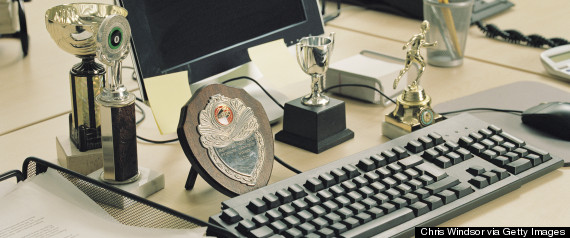Time management doesn't actually help you be more productive or happier, experts say. What do you need instead? Energy management.
By Leigh Newman
Sign 1: People often say, "You have an amazing work ethic!"

When it comes to supervising the work project, selling the raffle tickets for the school benefit and supervising the kitchen renovation, you consider yourself someone who can get things done. You work hard at everything you do. You're reliable—and not a quitter.
How this drains you: You're doing what you can—and must. Not necessarily what you want.
How to fix it: After every activity you accomplish in a day, take 30 seconds to ask yourself how it made you feel. Did it cause your energy to go up, down or to stay flat? "If it's flat or down, write down the name of the activity in one column in red pen," says James Clawson, Johnson & Higgins Professor of Business Administration at the University of Virginia and co-author of the energy-management book Powered by Feel. "If it's up, write down the activity in another column in green." Do this for one week straight. Then look at the results. "How can you rearrange things so that you spend the majority of your life on green activities—ones that generate energy?" says Clawson. "This is where choice comes in—your choice to live a life of obligation or a life of purpose and fulfillment."
Sign 2: Your friends (and doctor) envy your expert-approved sleep schedule.

You used to think of yourself as a late-night person. But then you had babies or a big job or both, all of which required you to get up at 5 a.m., get going by 7 a.m. and get to bed by 10 p.m. Which is just what the experts say, right? Seven hours of sleep a night. Only you're fuzzy-headed. Constantly.
How this drains you: All of us run on various internal clocks, says Michael Menaker, PhD, professor of biology at the University of Virginia. The most dominant of these clocks is the brain's, which coordinates others in the liver, kidney and what he says may be "zillions of other places in the body." (Even cells, he says, may each have their own clocks). How this many clocks synchronize with the brain's and with the sun's affects your sleep, your metabolism, your body temperature, even your cognitive function. And each of us, he believes, has our most optimal method, based on how we work and how we respond to light. If you're working against your own internal time, you're not performing at your best. (Think about it: How well does your brain work at dawn? Have you ever, say, made a peanut-butter-mayo sandwich? Or brushed your teeth with face cream? Or poured juice into your coffee...Oh wait, I'm talking about myself.)
How to fix it: TRY to fit your high-demand tasks into your peak-performance period (yes, it's probably hard to find a job that lets you work form 11 p.m. to 5 a.m.; but then, also yes, you could try working 9 a.m. to 4 p.m.-ish, then save an extra hour or two hour for challenging projects at 10 p..m., before you go to bed.) Our advice: Give your boss this book for her birthday Reset Your Inner Clock: The Drug-Free Way to Best-Ever Sleep, Mood, and Energy.
Sign 3: You've earned a shelf of glittering trophies.

You got a promotion. You won the neighborhood tennis tournament. You scored first prize in the poetry contest. You set very clear goals for yourself—and then you go about making them happen.
How this drains you: You're going for proof that you're good at a job or an activity—not what you enjoy about it.
What to do: During interviews with 500 top-performing athletes, surgeons, coaches and astronauts, Clawson's co-author Doug Newburg found that "those people who were performing in order to get a very specific feeling and who reminded themselves of that feeling in times of difficulty were much likely to rebound from obstacles than those who were pursuing any one specific goal," says Clawson. For example, an Olympic-gold-medalist swimmer was cited in the book as pursuing "easy speed," which he defined as "a harmony he felt in the water when he tried about 85 percent but got 100 percent of his speed." He was after a state of mind (and body). And so, if your focus is achieving that state, then failing to achieve a trophy, award, promotion or milestone, though still painful, will not be devastating. You're not losing energy by either not getting that outside marker—or by getting that outside marker. Instead, you're fueling your energy stores by trying to attain your version of "easy speed." The first step? Identifying what makes you your best. "When we're kids, nobody asks us how different activities make us feel," says Clawson. "And we all need that." So return to item number one on this and examine each green activity as you do it. How you perceive specifically each uptick of energy? Does it make you feel fast and light (as say, dance might?). Strong and powerful (similar to working out?). Quietly magnificent (playing the piano?). Name it—then make it your first prize.
Sign 4: Your ability to crush it—non-stop.

Every day, you zoom into work, plant yourself at your desk and power through! You work eight hours straight—no breaks for lunch, coffee or even a walk. By doing this, you get everything done and can leave right at 5 p.m. (Stay-at-homers, you do this, too—for longer! You power through 10 hours: laundry, check; music class, check; shopping; check; march, march, march until 7 p.m.).
How this drains you: You're not giving your body time to rest. This causes you to be less productive and resourceful, meaning that you get less back from every hour you put in.
How to fix it: "Work in 90-minute blocks," says Tony Schwartz, energy-management consultant and author of Be Excellent at Anything: The Four Keys To Transforming the Way We Work and Live, who says that our natural daytime rhythms are made up of more-wakeful periods, followed by those that are less wakeful, during which our bodies rest and restore energy. At the end of a 90-minute block, advises Schwartz, stop, eat a meal, exercise or just rest. Then go back and do another block. "No one works at peak performance for more than four-and-a-half hours per day," he says. "You can work more than that—but gradually, you're working at less and less and less of a peak level until eventually, you're losing energy and working more."
Sign 5: Your efficient use of time.

There are two ways home. The long way adds 20 minutes to your drive, through a forest. The shortcut takes you through grimy industrial wasteland—full of factories and highways. You take the shortcut. It gets you home faster, which means more time with your husband and kids—and a few minutes scanning Facebook on your tablet before dinner.
How this drains you: You're saving time, yes. But robbing yourself of environmental happiness, robs you of energy.
How to fix it: Consider the heart surgeon profiled in Clawson and Newburg's Powered by Feel. The surgeon had two routes to his operating room. One took him through a dark hallway filled with empty boxes. The other, more time-consuming route took him through the main area of the hospital where he passed windows, plants and co-workers. The latter gave him energy, the former did not. If he were your heart doctor (i.e., the man opening your chest) ask yourself which route you'd rather him take before he operated on you: Fast and discouraging or slow and uplifting? Now slap this question on your own life. How can you be your best for the people you love? Going a little slow may be the quickest route to walking through that door and being calm and kind with everybody—even if dinner is boiling over and nobody let the dog out, by the look of the hallway rug.


